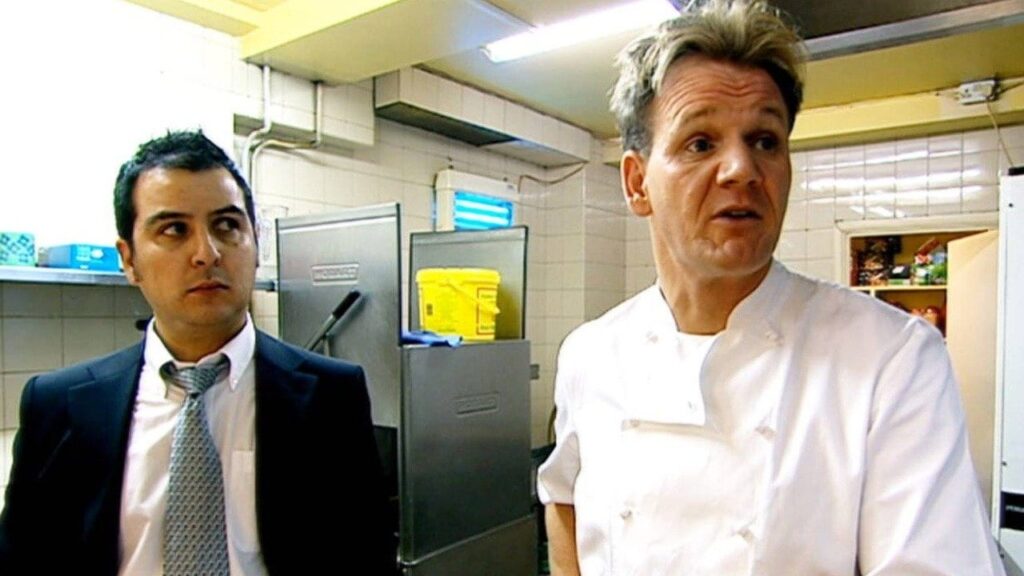“D-Place” on Ramsay’s Kitchen Nightmares – TV Review

Episode: D-Place
Season: 2
Show: Ramsay’s Kitchen Nightmares
In the second episode of “Ramsay’s Kitchen Nightmares” Season Two, Gordon Ramsay visits D-Place, a restaurant and nightclub in Chelmsford, Essex, that is struggling to find its identity and maintain a consistent customer base. The episode is a rich study in how a lack of clear vision, leadership, and culinary direction can lead to a restaurant’s downfall. Through Ramsay’s intervention, D-Place’s story becomes a compelling narrative about the importance of quality, the pitfalls of trying to be everything to everyone, and the transformative power of focused leadership and culinary excellence.
The Conundrum of D-Place
From the outset, D-Place presents itself as a jack-of-all-trades, attempting to operate as a restaurant by day and a nightclub by night. This dual identity creates a conflict that is evident in every aspect of the establishment, from its confused menu to its disjointed decor. The kitchen, led by chef Philippe Blaise, is in disarray, with a lack of fresh ingredients and an over-reliance on frozen food undermining the quality of the dishes served. The management, under the ownership of Israel and Tara, seems overwhelmed, unable to decide on a clear direction for D-Place or to instill a sense of pride and purpose in their staff.
Ramsay’s Diagnosis: Identifying the Root Issues
Gordon Ramsay quickly identifies the core issues plaguing D-Place: a fragmented identity, a lack of culinary quality, and weak leadership. Ramsay challenges Israel and Tara to commit to a singular vision for their establishment and to understand that a restaurant cannot succeed without a clear identity and a dedication to quality. For Ramsay, the solution lies in simplifying the menu, focusing on fresh, local ingredients, and transforming D-Place into a destination known for its food first and nightlife second.
Behind the Scenes: The Struggle for Change
One of the episode’s most revealing aspects is the behind-the-scenes look at the resistance Ramsay faces in implementing changes. Chef Philippe’s attachment to his complex, yet uninspired menu serves as a microcosm of the broader issue at D-Place: a resistance to the kind of fundamental change needed to turn the restaurant around. Ramsay’s efforts to mentor Philippe and to encourage him to take pride in his culinary creations are met with skepticism, highlighting the challenges inherent in changing established practices and attitudes.
The Intervention: A Focus on Freshness and Simplicity
Ramsay’s intervention is multifaceted, focusing on both the culinary and operational aspects of D-Place. By introducing a simpler menu that emphasizes fresh, high-quality ingredients, Ramsay aims to elevate the dining experience and to redefine what D-Place stands for. Additionally, Ramsay addresses the decor and layout of the restaurant, creating a more cohesive and inviting space that aligns with the new culinary direction.
The Relaunch: A Night of Reckoning
The relaunch of D-Place is tense and fraught with uncertainty. Ramsay’s presence in the kitchen and his guidance during service are critical in ensuring that the evening is a success. The episode captures the highs and lows of the night, from the kitchen’s struggle to keep up with orders to the moments of triumph when diners express their satisfaction with the transformed menu and ambiance. The relaunch serves as a crucial test for Israel, Tara, and Philippe, challenging them to maintain the standards set by Ramsay and to commit to the new identity of D-Place.
Reflections on D-Place’s Journey
“D-Place” is a potent reminder of the complexities of the restaurant industry and the importance of identity, quality, and leadership. Through Ramsay’s tough but fair guidance, D-Place is given a chance to redefine itself and to strive for a level of culinary excellence that had previously been lacking. The episode is not just about the transformation of a struggling restaurant; it’s about the personal growth of the individuals involved and the realization that success in the hospitality industry requires passion, dedication, and a clear vision.
The episode on D-Place stands as a testament to the potential for change and the impact of focused, passionate leadership in overcoming the challenges facing the restaurant industry. It is a narrative of hope, resilience, and the rediscovery of culinary passion, offering valuable lessons for restaurateurs and chefs alike.


